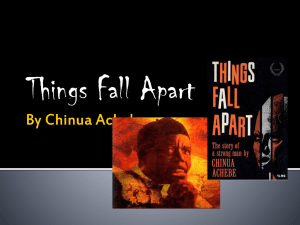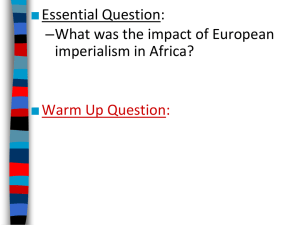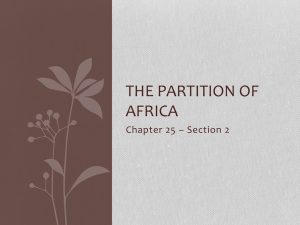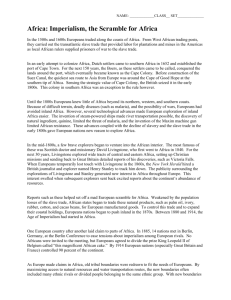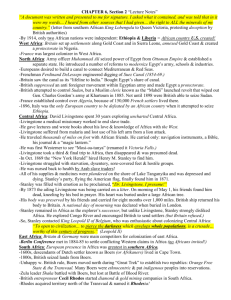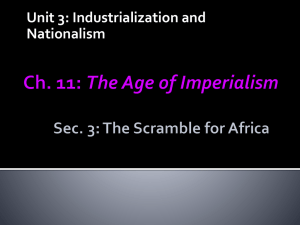Africa Falls Into European Hands
advertisement
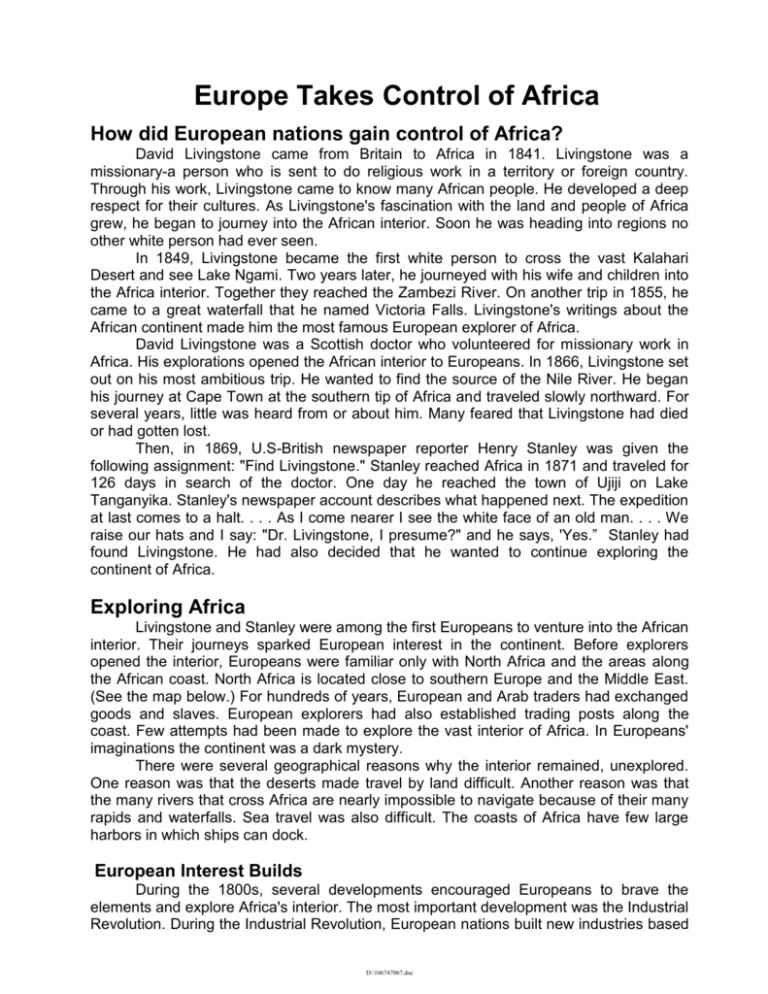
Europe Takes Control of Africa How did European nations gain control of Africa? David Livingstone came from Britain to Africa in 1841. Livingstone was a missionary-a person who is sent to do religious work in a territory or foreign country. Through his work, Livingstone came to know many African people. He developed a deep respect for their cultures. As Livingstone's fascination with the land and people of Africa grew, he began to journey into the African interior. Soon he was heading into regions no other white person had ever seen. In 1849, Livingstone became the first white person to cross the vast Kalahari Desert and see Lake Ngami. Two years later, he journeyed with his wife and children into the Africa interior. Together they reached the Zambezi River. On another trip in 1855, he came to a great waterfall that he named Victoria Falls. Livingstone's writings about the African continent made him the most famous European explorer of Africa. David Livingstone was a Scottish doctor who volunteered for missionary work in Africa. His explorations opened the African interior to Europeans. In 1866, Livingstone set out on his most ambitious trip. He wanted to find the source of the Nile River. He began his journey at Cape Town at the southern tip of Africa and traveled slowly northward. For several years, little was heard from or about him. Many feared that Livingstone had died or had gotten lost. Then, in 1869, U.S-British newspaper reporter Henry Stanley was given the following assignment: "Find Livingstone." Stanley reached Africa in 1871 and traveled for 126 days in search of the doctor. One day he reached the town of Ujiji on Lake Tanganyika. Stanley's newspaper account describes what happened next. The expedition at last comes to a halt. . . . As I come nearer I see the white face of an old man. . . . We raise our hats and I say: "Dr. Livingstone, I presume?" and he says, 'Yes.” Stanley had found Livingstone. He had also decided that he wanted to continue exploring the continent of Africa. Exploring Africa Livingstone and Stanley were among the first Europeans to venture into the African interior. Their journeys sparked European interest in the continent. Before explorers opened the interior, Europeans were familiar only with North Africa and the areas along the African coast. North Africa is located close to southern Europe and the Middle East. (See the map below.) For hundreds of years, European and Arab traders had exchanged goods and slaves. European explorers had also established trading posts along the coast. Few attempts had been made to explore the vast interior of Africa. In Europeans' imaginations the continent was a dark mystery. There were several geographical reasons why the interior remained, unexplored. One reason was that the deserts made travel by land difficult. Another reason was that the many rivers that cross Africa are nearly impossible to navigate because of their many rapids and waterfalls. Sea travel was also difficult. The coasts of Africa have few large harbors in which ships can dock. European Interest Builds During the 1800s, several developments encouraged Europeans to brave the elements and explore Africa's interior. The most important development was the Industrial Revolution. During the Industrial Revolution, European nations built new industries based D:\106747067.doc on new technology and work methods. Raw materials, such as coal, iron ore, gold, silver, tin, and copper, were needed to fuel new European factories. Many of these raw materials could be found in Africa. As the Europeans saw it, Africa was a huge treasure box-theirs for the taking. The Europeans cared little for African cultures that were hundreds or thousands of years old. Shipping routes were another reason Europeans became interested in Africa. In 1869, a French company built the Suez Canal in Egypt. The canal connects the Mediterranean Sea to the Indian Ocean by way, of the Red Sea. The opening of the canal revolutionized world shipping. Ships no longer had to travel around the tip of South Africa to reach Asia. The trip from London, England, to Bombay, India, was shortened by more than 4,000 miles. In 1875, the British government bought controlling interest in the Suez Canal company. At the time, the British also controlled India. The British became concerned about losing control of the canal, so they sent an army into Egypt. A few years later, the British made Egypt a protectorate. As a protectorate, Egypt stayed independent, but its foreign policy was controlled by Britain. The Scramble for Africa The policy of conquering and ruling other lands is called imperialism. Generally, imperialism means a powerful nation controls a weaker one. There were many reasons for the rise of imperialism in Africa and elsewhere. Again, one reason was the Industrial Revolution. European countries wanted unlimited access to the raw materials they needed to fuel their factories at home. They took colonies in Africa that had those raw materials. Colonialism is a term for the policy of taking over foreign lands in order to exploit them economically. Another reason for imperialism was national pride. Some countries sought colonies because they thought an empire would make them look important in the eyes of the world. King Leopold of Belgium sent Henry Stanley to the Congo to make treaty arrangements with the local leaders. Stanley was very successful. By 1884, Belgium, one of the smallest countries in Europe, controlled an area in Africa that equaled the size of all of Western Europe. Belgium gained much wealth and prestige from its colony. A third cause of imperialism was a military build-up throughout Europe. Many European countries were increasing the, size and power of their navies. Sea power was vital for controlling important trade routes and protecting economic interests. Britain's takeover of the Suez Canal is an example of this type of imperialism. Many other European nations also used their colonies in Asia and Africa to provide and store supplies for their navies. Another cause of imperialism had nothing to do with wealth or power. It was the belief that westerners were superior to other people. Many Europeans looked down on traditional African culture. They believed that Africans were backward and uncivilized. Europeans thought that it was their responsibility to bring Christianity and Western culture to Africa. Europeans Divide the Continent In the mid to late 1800s, one European nation after another began to claim portions of Africa. Then the nations of Europe began to squabble with one another over lands they claimed. In 1884-85, the European powers attended a conference in Berlin, Germany. The purpose of the Berlin Conference was to settle the disputes of European nations that held territory in Africa. Although the nations of Europe were discussing the D:\106747067.doc fate of Africa, no representatives from Africa were invited to the conference. At the Berlin Conference, the, European powers divided the African continent into colonies. By 1910, only Liberia and Ethiopia remained independent. During the 1800s, Ethiopia's leader, King Menelik II, had modernized his country and its army. In 1896, Italy tried to conquer Ethiopia but lost in battle to the Ethiopian army. After that battle, the European powers recognized Ethiopia's independence. Liberia had been established by the American Colonization Society to resettle African Americans who had won freedom from slavery. Due to its ties to the United States, Liberia's independence was recognized by European nations. D:\106747067.doc How did the Zulus react to European expansion in Southern Africa? "I hear the sound of the feet of a great white people. They will tread this land flat." Shaka, king of the Zulus, uttered these words on his deathbed. The Zulus are a people from Southern Africa, Zululand, the area controlled by Shaka and the Zulus, took up most of what is today the country of South Africa. Shaka was a military genius with a gift for organization. He was also a cruel and ruthless leader. By 1823, his empire stretched over an area of 100,000 square miles. He had defeated all of the African tribes that had opposed him. Just five years later, he lay dying, killed by his own brother, Dingaan. Zulus resisted Boer expansion into Zulu territory in the 1800s. They fought many wars, but in the end were defeated. Pictured here are Zulu head men, or chiefs. Today, there are about two million Zulus living in South Africa. Europeans in Southern Africa Like other Africans, the Zulus opposed European, expansion into their territories. A small group of Dutch settlers had arrived in what is now Cape Town on the southern coast of Africa in 1652. The Dutch farmers soon began claiming lands that belonged to the African groups in the region, includin the San and the Khoi Khoi. There were constant clashes. When the British captured Cape Town in 1806, many of the Dutch left and headed northward. They called themselves Boers the Dutch word for "farmers." During the 1830s and early 1840s, thousands of' Boers journeyed into the African interior, on what is called the Great Trek. As the Boers trekked northward into Zulu territory, conflict between the Boers and the Zulus became certain. In 1838, the landhungry Boers crossed the Mountains. They went to see the Zulu king to ask for permission to settle there. The king was Shaka's brother Dingaan. Dingaan invited a group of the Boers to a feast. There were many hours of dancing, eating, and drinking. When the Boers got up to leave, they were attacked by Zulu warriors. All 70 Boers who attended the feast were killed. In the next days and weeks, Zulu raiders attacked the many Boer families that had settled on the land. The Boers refused to leave the land and decided to seek revenge on the Zulu king. With 500 soldiers, the Boers arrived on the banks of the Buffalo River where they waited for the Zulus to attack. On December 16, 1838, thousands of warriors attacked. The battle raged for six hours. But the Zulu spears and courage was no match for the Boers' guns. The Zulus were defeated and the Boers took the land. For a while, an uneasy peace settled over the land, but trouble soon began again. Europeans had little respect for or D:\106747067.doc knowledge of Zulu customs and culture. A new Zulu king said that he wished to be friends with the Boers. However, the king believed that the European settlers had no right to tell him how he should rule his people. Tensions between the Zulus and the Boers increased. The British Defeat the Zulus In December 1878, the British, who were taking control of more of South Africa, demanded that the Zulu army be disbanded. The British knew the Zulus would not accept this demand. On the morning of January 11, 1879, the British forces crossed into Zululand. The British commander had an army of nearly 18,000 officers and men. Each carried a single-shot rifle. They faced a Zulu army of about 25,000 men. Their chief weapon was a short stabbing spear. On January 22, 1879, Zulu warriors wiped out a British regiment, killing over 1,000 soldiers. It was the biggest defeat ever suffered by a European force in South Africa. Despite this success, the final outcome was never in doubt. For all their bravery, the Zulu warriors could not hold off the British army. In July, the British captured and burned the Zulu capital. The Zulu leader was brought to England and punished. As Shaka predicted, the Zulu nation had been crushed by "the feet of a great white people." The Effects of European Rule The Zulu war represents one of the worst effects of imperialism. The Zulus tried to defend their land from foreign invaders. The Europeans viewed and treated African people as inferior, as people of little importance or value. They had little respect for African cultures or customs. Africans were often treated as second-class citizens in their own countries. In almost every African colony, some form of discrimination existed. Another negative effect of imperialism was economic exploitation. This means that the Europeans used the African people to make a profit for themselves. The purpose of colonialism was to produce wealth for the colonizing power. Natural resources such as minerals, lumber, and rubber were exported from Africa to Europe. Large plantations in Africa produced cotton and other cash crops. Africans worked hard, but received none of the profit. The traditional subsistence system of farming was practically destroyed. African workers were also taken advantage of by their European bosses. Working conditions were very harsh. Workers were sometimes treated like slaves. They were not allowed to leave their jobs and were severely punished if they broke the rules. Another way the Europeans exploited Africans was by forcing them to pay taxes. The people of European countries did not want to pay taxes to help support their African colonies. Africans who did not pay the taxes could be fined or arrested. Often the only way to earn enough money to pay the taxes was to work as a farmhand, servant, or miner for the Europeans. Sometimes, the jobs were far from workers' homes and villages. The distance separated family members and weakened traditional family values. African family and village life. The family and village were not the only institutions that changed as a result of imperialism. Africa's traditional political and religious systems were also affected. The chiefs lost the power and respect they had once had. In the past, it was believed that the chiefs held power through their connection with the tribe's ancestors. Under European rule, many Africans became Christians. They no longer believed in the chief's power. European-style governments replaced traditional African rule. D:\106747067.doc Improvements in Africa European rule did bring some improvements to the colonies. However, few of the improvements' were made because they were good for Africans. Most were carried out because they made the colonies more profitable and easier to manage. Using African labor, the colonial powers built a network of roads and railroads. The roads and railroads made the transport of natural resources from the interior of Africa to the coast more efficient. From Africa these resources were shipped around the world. Later, Europeans introduced telegraph and telephone service to improve communication. After African nations won independence, these roads and telephone lines helped African nations build their economies. Europeans also brought modem medicine and health practices to Africa. The primary reason for this was to help protect themselves from disease. Hospitals and clinics did help bring some of the terrible diseases that had killed many Africans under control, as well. Colonial governments sent a number of Africans to school in Europe. Again, these educational programs were designed to help maintain colonial rule. Some Africans were trained to fill minor positions in colonial governments. Others received training so they could work in industries controlled by the colonial powers. Questions to thoroughly answer on a separate piece of paper: 1. What was the “Scramble for Africa”, and why did it occur? 2. How did European rule change traditional African ways of life? 3. Why do you think the Europeans eventually granted their colonies independence? 4. While the Europeans were all democracies when they granted their former African colonies independence, what form of government where the Africans actually trained in by the Europeans? D:\106747067.doc

